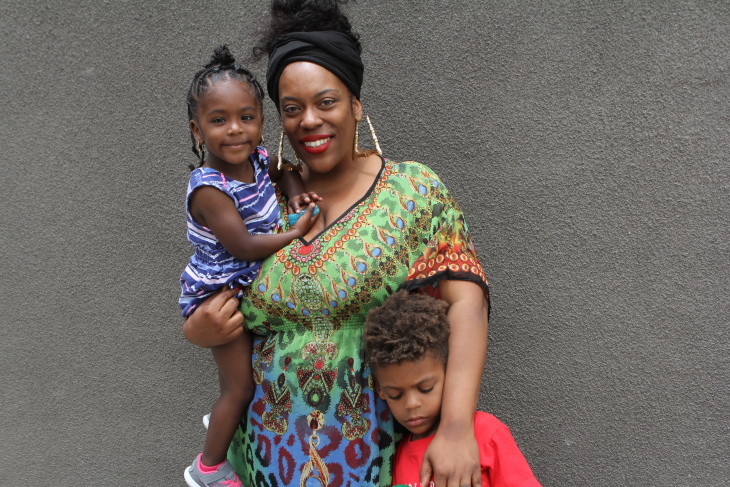Black Maternal Health week (April 11-17), founded and led by the Black Mamas Matter Alliance.
My stomach had been hurting all day but I could not possibly be going into labor — I was only at 20 weeks. My water had broken. I had explained these stomach pains to my doctor earlier that month, earlier that week, and even earlier that day. Each time I drove to Beverly Hills for my appointment, I was told I was fine. The bleeding? Just spotting, you’re fine. The cramps? They’re normal, you’re fine. My request to have tests done? “No need, you’re fine.”
Early in my pregnancy, I had begun to wonder if I was receiving substandard medical care. Could my doctor be dismissing me because I was an unmarried, pregnant Black women on Medi-Cal? I was convinced by medical staff that most of my concerns were just typical first-time mother over-worrying. I saw all the upper class Persian women get more attention and face-time with the doctor, while I was getting an average of 10 minutes each visit but I made justifications because I trusted my doctor and his expertise. If this was where many rich women were going for care, I figured I must be in good hands.
My water had definitely broken. When my now husband and I got to the nearest hospital, which was not where I was supposed to deliver, our parents were all there. We were told the baby’s lungs had not fully developed and he would not live outside of my womb. Still, I would have to push. I had to go through the labor and the delivery.
It was not until I delivered the baby, a boy who was stillborn, that I cried. I couldn’t stop screaming the words “no” and “please”. “No” was my disbelief. “Please” was my last appeal to God to change what just happened.
My nurse, an older Black woman, held my hand and treated me with so much care and compassion. My grief would not allow me to hold the baby but she held him for me and pressed him against my chest. I just put my hand on his very small body and held it there, unable to take him into my arms. Today, I wish I would have.
The loss of our first baby was devastating. Seven months later, we found out I was pregnant once again. This time, we switched medical providers.
By month five of my second pregnancy, I was having complications. My new medical staff was checking in with me so frequently that I almost got annoyed. They immediately put me on bedrest. Everyone made me feel like my pregnancy was their priority. It was one of the most difficult periods of my life but the level of care I received gave me hope. It also confirmed for me that although I had previously gone to one of the most coveted medical providers in one of the richest neighborhoods in Los Angeles for my care, I had received racially biased and subpar care.
Despite the excellent prenatal care I was receiving this time around, I spent two months in the hospital before having my son at 27 weeks — an experience that brought me back to the discrimination of my first delivery. I was ignored. I was overlooked. My life and the life of my child were both in danger.
This time, I was told that I couldn’t possibly be having contractions because they weren’t showing up on a monitor. I was feeling such extreme pain that I thought I was dying. After my nurse ignored several of my concerns, I physically grabbed her arms and pulled her down to me and demanded that she check between my legs because the baby was coming.
Alarms went off, nurses were running and a doctor jumped onto my bed and told me she had to stick her hand inside of me to keep my son’s umbilical cord inside. A nurse told me I needed to go under so they could get my baby out immediately. I had little time to think about any of this. I had to give consent although I was unsure and under informed. In seconds, I was unconscious.
I woke up an hour later with a scream. I was in so much pain. I opened my eyes to my mother who informed me that my son was born. “Is he perfect?” I asked. “So perfect.” she responded. Only two pounds and 12 ounces, but perfect.
Today, my son is a beautiful 6 year old who is becoming bilingual, loves dancing, sports and Black people. He has dressed as both Bobby Seale and Malcolm X for Halloween, and throws up the power fist for photos without prompt.
Now, after all of this drama, would you believe I went on to have another baby? Chile…But this time, I knew what my care should look like and that I wanted a full term, safe and happy pregnancy.
My mother had a friend named Rae Jones who ran an organization called Great Beginnings for Black Babies and it was from them that I received so much support and access to resources. I joined the Black Infant Health Program, a California statewide pregnancy education program for Black women, and learned more about my pregnancy and how to advocate for myself. I learned that Black women in America are 2 to 6 times more likely to die from complications of pregnancy and more than twice as likely to lose their babies than white women. My story was just one of many.
Though I did require another surgery to maintain my latest pregnancy, my daughter was born full term with no issues. I then devoted my life to ensuring that other Black women would never have to have three tries in order to get it right. We have so much work ahead of us but there are organizations around the country, most represented in an alliance called Black Mamas Matter, who are fighting to ensure that other Black women don’t experience what I did.
Black mamas, a safe and sacred pregnancy is your birthright and your legacy. Black women were successfully delivering babies back when hospitals wouldn’t even let us in. Connect to doulas and midwives who will assist in making sure your expectations and goals are met. There is a nationwide support system ready to love on you and the life you plan to bring forth. Despite the statistics, we can have the birth experiences that we deserve.
RELATED STORIES:
Serena Williams’ Postpartum Issues Are A Lesson In Healing After Giving Birth
Maternal Health Week: I Gave Stillbirth At 20 Weeks After Complaining For Weeks, Did I Receive Substandard Medical Care? was originally published on hellobeautiful.com
















